Economic Liberalism and Its Rivals: The Formation of International Institutions among the Post-Soviet States
Autor Keith A. Dardenen Limba Engleză Paperback – 11 iul 2010
| Toate formatele și edițiile | Preț | Express |
|---|---|---|
| Paperback (1) | 321.14 lei 6-8 săpt. | |
| Cambridge University Press – 11 iul 2010 | 321.14 lei 6-8 săpt. | |
| Hardback (1) | 631.70 lei 6-8 săpt. | |
| Cambridge University Press – feb 2009 | 631.70 lei 6-8 săpt. |
Preț: 321.14 lei
Nou
Puncte Express: 482
Preț estimativ în valută:
61.46€ • 63.93$ • 50.74£
61.46€ • 63.93$ • 50.74£
Carte tipărită la comandă
Livrare economică 12-26 aprilie
Preluare comenzi: 021 569.72.76
Specificații
ISBN-13: 9780521156257
ISBN-10: 0521156254
Pagini: 366
Ilustrații: illustrations
Dimensiuni: 156 x 235 x 20 mm
Greutate: 0.5 kg
Editura: Cambridge University Press
Colecția Cambridge University Press
Locul publicării:New York, United States
ISBN-10: 0521156254
Pagini: 366
Ilustrații: illustrations
Dimensiuni: 156 x 235 x 20 mm
Greutate: 0.5 kg
Editura: Cambridge University Press
Colecția Cambridge University Press
Locul publicării:New York, United States
Cuprins
Part I. Theory and Methodology: 1. A natural experiment; 2. A theory of international order; 3. Three international trajectories; 4. Liberalism and its rivals: history, typology, and measurement; Part II. Contingent Selection and Systematic Effects: Country-Level Analyses of Elite Selection, Ideational Change, and Institutional Choice, 1991–2002: 5. The Baltic states and Moldova; 6. Russia, Belarus, and Ukraine; 7. The Caucasus; 8. Central Asia; Part III. Comparing Cases: 9. Alternative explanations and statistical tests; 10. Smoking guns: a causal history of institutional choice; 11. Conclusions and implications of the analysis.
Recenzii
'This book is not only an important contribution to post-communist studies. It is also a deliberate attempt to chart a novel theoretical position that challenges current orthodoxies from the perspective of a scholarly tradition whose growth seems to have reached a new threshold of relevance.' Paul Dragos Aligica, Perspectives on Politics
'Why do different countries make different choices when it comes to international economic institutions? Darden sees the post-Soviet states as an ideal test case, because they began with similar characteristics and histories but nonetheless chose differently … International relations theorists will find the effort a genuine contribution to a key debate. General readers will benefit from what is the most thorough review available of the economic foreign policies of nearly all 15 former Soviet republics during the 1990s.' Robert Levgold, Foreign Affairs
'Drawing on the natural experiment that was the collapse of the USSR, this superb analysis of distinct economic trajectories among the former Soviet republics demonstrates that economic ideas led policymakers to adopt divergent policies regarding membership in international institutions. Darden's meticulously researched and incisively argued account transforms our understanding of post-communist policymaking, and of the causal role of ideas in institutional choice.' Anna Grzymala-Busse, University of Michigan
'Will the post-Soviet states join the global economy, reintegrate with Russia, or go it alone? At a time when Russia is attempting to reshape its 'near abroad,' Keith Darden has provided us a theoretically innovative and much-needed study of the foreign economic policies of countries about which we still know far too little.' Jeffrey Kopstein, University of Toronto
'The book has a clear and strong argument about the role of ideas in economic policymaking. The author traces how elites in the states to emerge from the collapse of the Soviet Union adopt different ideas and then make choices about how to interact with international institutions based on these ideas. The simultaneous creation of 15 states is a near perfect test of this kind of theory. This book fits into a much needed and growing literature on the role of actors and ideas as important independent variables in explaining political, social, and economic outcomes of any sort. It is particularly good at stressing the role of contingency in producing outcomes. This book could become a major text in shaping this academic debate and in teaching this kind of argument.' Michael McFaul, Stanford University
'Why do different countries make different choices when it comes to international economic institutions? Darden sees the post-Soviet states as an ideal test case, because they began with similar characteristics and histories but nonetheless chose differently … International relations theorists will find the effort a genuine contribution to a key debate. General readers will benefit from what is the most thorough review available of the economic foreign policies of nearly all 15 former Soviet republics during the 1990s.' Robert Levgold, Foreign Affairs
'Drawing on the natural experiment that was the collapse of the USSR, this superb analysis of distinct economic trajectories among the former Soviet republics demonstrates that economic ideas led policymakers to adopt divergent policies regarding membership in international institutions. Darden's meticulously researched and incisively argued account transforms our understanding of post-communist policymaking, and of the causal role of ideas in institutional choice.' Anna Grzymala-Busse, University of Michigan
'Will the post-Soviet states join the global economy, reintegrate with Russia, or go it alone? At a time when Russia is attempting to reshape its 'near abroad,' Keith Darden has provided us a theoretically innovative and much-needed study of the foreign economic policies of countries about which we still know far too little.' Jeffrey Kopstein, University of Toronto
'The book has a clear and strong argument about the role of ideas in economic policymaking. The author traces how elites in the states to emerge from the collapse of the Soviet Union adopt different ideas and then make choices about how to interact with international institutions based on these ideas. The simultaneous creation of 15 states is a near perfect test of this kind of theory. This book fits into a much needed and growing literature on the role of actors and ideas as important independent variables in explaining political, social, and economic outcomes of any sort. It is particularly good at stressing the role of contingency in producing outcomes. This book could become a major text in shaping this academic debate and in teaching this kind of argument.' Michael McFaul, Stanford University
Notă biografică
Descriere
Darden traces the decisions that shaped the entry of post-Soviet states into the world economy.














